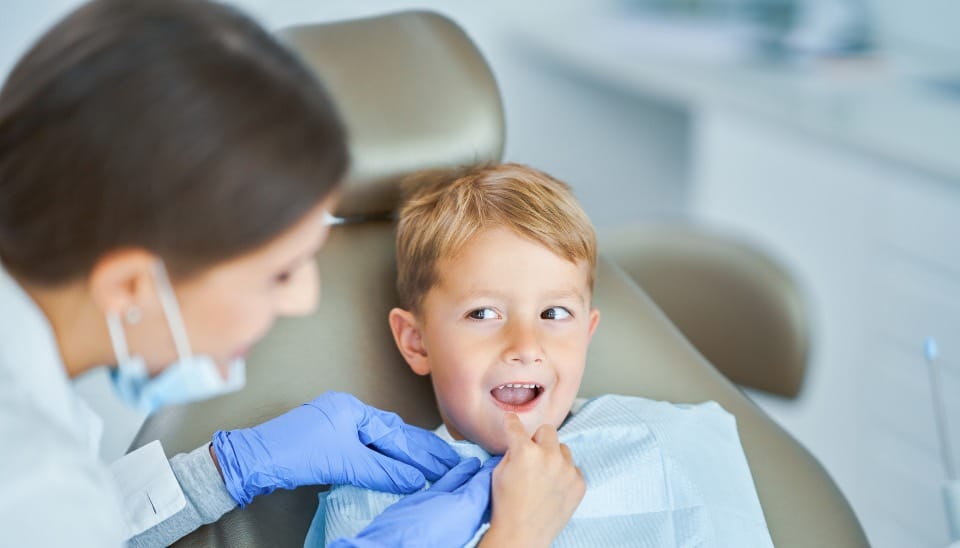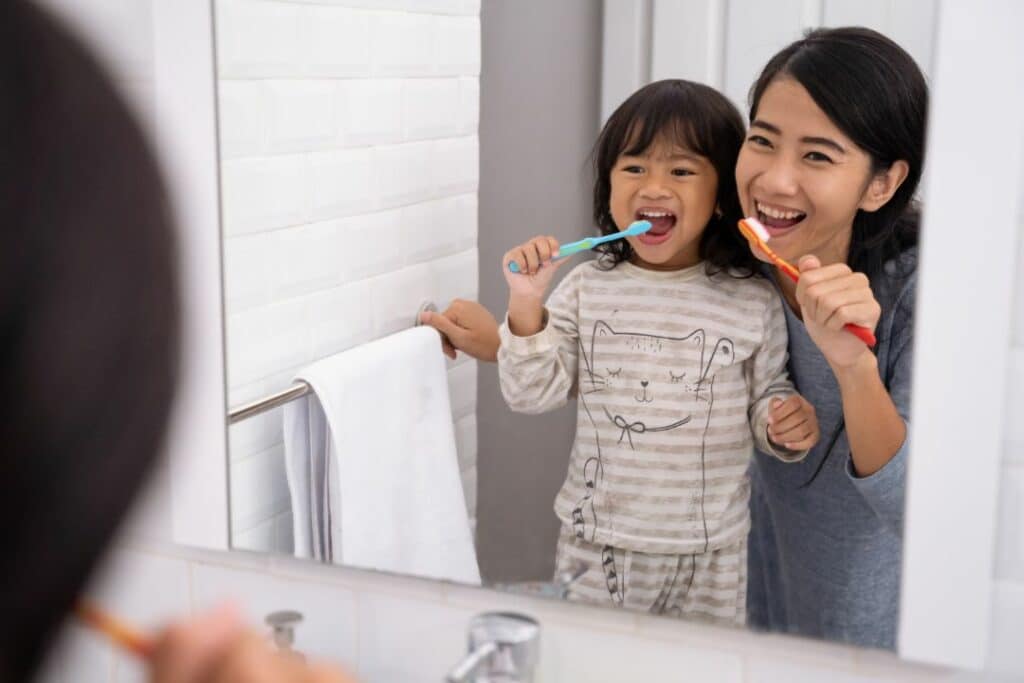Helping tamariki (children) develop healthy teeth and gums is one of the most important things you can do as a parent or caregiver. Good oral health habits established early can set your child up for a lifetime of strong teeth, confident smiles, and better overall health.
In New Zealand, we are lucky to have a free school dental programme, but many whānau (families) are not aware of what it includes – or what extra steps they can take at home.
This guide will help you understand why early dental care matters, how to care for your child’s teeth at every stage, which foods support a healthy smile, and how to make dentist visits stress-free for your kids.
Why Oral Health Matters for Kiwi Kids
Poor oral health can affect far more than your child’s smile. Dental decay (holes in teeth) is one of the most common chronic childhood conditions in New Zealand, despite being almost entirely preventable. According to the NZ Ministry of Health, around 40% of five-year-olds experience tooth decay by the time they start school (Ministry of Health). Untreated dental problems can cause pain, difficulty eating, trouble sleeping, and missed school days. Long term, they can lead to speech issues, lower self-esteem, and even affect general health.
Data from Environmental Health Intelligence NZ (EHINZ) shows that in 2022, about 56% of five‑year‑olds seen by community oral health services were caries‑free, while the mean number of decayed, missing or filled teeth (dmft) was 2.0 per child (EHINZ 2024 report). The good news is that regular dental care and strong home routines can reduce these numbers significantly.
Understanding New Zealand’s School Dental Programme

New Zealand has one of the most comprehensive school dental programmes in the world. It provides free basic oral health care for children from birth through to their 18th birthday, including:
- Regular check-ups
- Preventive treatments (like fluoride varnish and fissure sealants)
- Fillings and extractions when necessary
However, the programme cannot replace daily home care or address all risk factors. Some families may still need to see a private dentist for more complex treatments or for earlier interventions if issues arise between scheduled visits.
The Importance of Early Dental Visits
One of the best ways to prevent dental problems is to book your child’s first dental visit by their first birthday, or within six months of their first tooth erupting – whichever comes first. This is supported by the New Zealand Dental Association (NZDA guide) and aligns with global best practice (American Academy of Pediatric Dentistry).
Early visits help:
- Spot issues before they become serious
- Give parents tailored advice for brushing and diet
- Get kids comfortable with the dental environment
The earlier children get used to visiting the dentist, the less likely they are to develop dental anxiety.
Read more: Healthy Smile = Healthy Child
Tips for Parents: Daily Care for Healthy Teeth

Parents play the biggest role in preventing dental problems. Here’s what you can do at each stage:
1. Babies and Toddlers (0–2 Years)
- Clean gums with a soft, damp cloth after feeds
- Brush teeth as soon as they appear using a small, soft-bristled brush and a smear of fluoride toothpaste (about the size of a grain of rice)
- Avoid putting baby to bed with a bottle containing milk, formula, or juice – this can cause “bottle caries” (severe decay)
2. Preschoolers (3–5 Years)
- Brush teeth twice daily with a pea-sized amount of fluoride toothpaste
- Supervise brushing – kids don’t have the coordination to brush effectively until around age 8
- Introduce flossing once teeth start touching
3. School-Age Children (6+ Years)
- Encourage independence with brushing, but check technique
- Make sure they continue to brush for two minutes, morning and night
- Provide a diet that supports healthy teeth (see below)
For detailed guidance on brushing, toothpaste strengths, and the “lift the lip” screening programme, check out KidsHealth NZ’s guide on caring for your child’s teeth.
Read more: Dental Tips for Kids
Foods That Promote Healthy Teeth
Diet plays a massive role in oral health. Sugary snacks and drinks are the main culprit behind decay, but it’s not just how much sugar kids eat – it’s how often. Frequent snacking exposes teeth to acid attacks all day long.
Smile-Friendly Foods:
- Dairy products like cheese, milk, and yoghurt (high in calcium and good for enamel)
- Crunchy fruits and vegetables like apples, carrots, celery (help clean teeth and stimulate saliva)
- Whole grains (slow energy release, less sticky than refined carbs)
- Water as the main drink (preferably fluoridated where available)
Foods to Limit:
- Sugary drinks (soft drinks, juice, sports drinks)
- Sticky lollies and dried fruit (cling to teeth and feed bacteria)
- Frequent snacking on crackers or biscuits
Communities with fluoridated water see around 40% lower lifetime incidence of tooth decay and nearly 50% fewer hospital admissions for children under 5 due to tooth decay (Ministry of Health).
Making Dental Visits Positive for Tamariki

Dental anxiety can start young, but there are ways to make check-ups something to look forward to rather than fear:
- Talk positively about dentist visits – avoid using words like “pain” or “needle”
- Play dentist at home to help kids understand what will happen
- Choose an appointment time when your child is well-rested and not hungry
- Celebrate visits with non-food rewards like stickers or extra playtime
Common Mistakes to Avoid
- Waiting until a child is in pain before seeing a dentist
- Assuming baby teeth don’t matter because they will “fall out anyway”
- Using too much toothpaste (risk of fluorosis)
- Letting kids sip on milk or juice throughout the day
Read more: First Dental Appointments for Kids: What to Expect
Conclusion
Helping your tamariki achieve lifelong oral health is about small, consistent habits: brushing twice daily with fluoride toothpaste, eating a balanced diet, and visiting the dentist early and regularly. New Zealand’s school dental programme provides a fantastic foundation, but parental guidance and support make the biggest difference.
By teaching kids to take pride in their teeth, you give them more than a smile – you give them confidence, comfort, and better overall health for life.
For more detailed advice, you can also explore the Ministry of Health’s oral health guidelines.
Frequently Asked Questions
When should I start brushing my baby’s teeth?
Start brushing as soon as the first tooth appears, using a soft baby toothbrush and a smear of fluoride toothpaste.
Is fluoride safe for kids?
Yes. Fluoride is proven to protect teeth from decay. Just be sure to use the recommended amount of toothpaste for your child’s age.
My child hates brushing. What can I do?
Make it fun – play music, use a reward chart, or let them choose a colourful toothbrush. Brushing together can also help.
Are baby teeth really that important if they fall out anyway?
Absolutely! Healthy baby teeth are needed for proper chewing, speech development, and holding space for adult teeth.
Can I take my child to a private dentist instead of using the school dental service?
Yes. Many parents use private dentists for earlier or more frequent visits. The key is making sure your child is seen regularly.
Site map
Services
Contact Us
T: 07 854 8905
E: info@thehdc.co.nz
3/111 Thomas Road,
Rototuna, Hamilton
copyright © 2025 Hamilton Dental Centre | Credit Terms | Web development by Digital Hothouse

